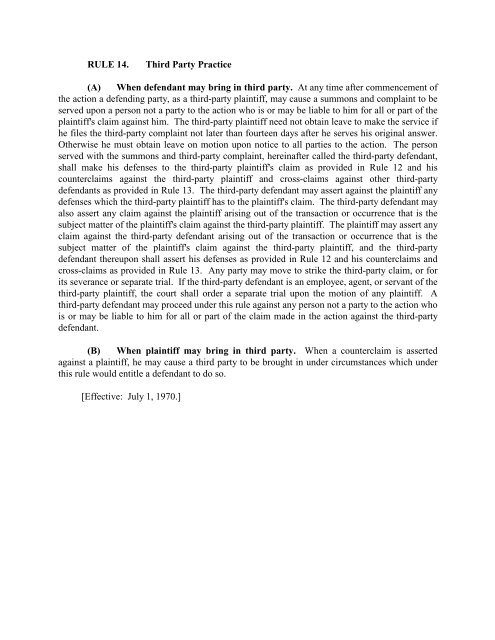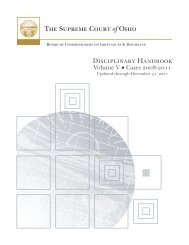Ohio Rules of Civil Procedure - Supreme Court
Ohio Rules of Civil Procedure - Supreme Court
Ohio Rules of Civil Procedure - Supreme Court
Create successful ePaper yourself
Turn your PDF publications into a flip-book with our unique Google optimized e-Paper software.
RULE 14. Third Party Practice<br />
(A) When defendant may bring in third party. At any time after commencement <strong>of</strong><br />
the action a defending party, as a third-party plaintiff, may cause a summons and complaint to be<br />
served upon a person not a party to the action who is or may be liable to him for all or part <strong>of</strong> the<br />
plaintiff's claim against him. The third-party plaintiff need not obtain leave to make the service if<br />
he files the third-party complaint not later than fourteen days after he serves his original answer.<br />
Otherwise he must obtain leave on motion upon notice to all parties to the action. The person<br />
served with the summons and third-party complaint, hereinafter called the third-party defendant,<br />
shall make his defenses to the third-party plaintiff's claim as provided in Rule 12 and his<br />
counterclaims against the third-party plaintiff and cross-claims against other third-party<br />
defendants as provided in Rule 13. The third-party defendant may assert against the plaintiff any<br />
defenses which the third-party plaintiff has to the plaintiff's claim. The third-party defendant may<br />
also assert any claim against the plaintiff arising out <strong>of</strong> the transaction or occurrence that is the<br />
subject matter <strong>of</strong> the plaintiff's claim against the third-party plaintiff. The plaintiff may assert any<br />
claim against the third-party defendant arising out <strong>of</strong> the transaction or occurrence that is the<br />
subject matter <strong>of</strong> the plaintiff's claim against the third-party plaintiff, and the third-party<br />
defendant thereupon shall assert his defenses as provided in Rule 12 and his counterclaims and<br />
cross-claims as provided in Rule 13. Any party may move to strike the third-party claim, or for<br />
its severance or separate trial. If the third-party defendant is an employee, agent, or servant <strong>of</strong> the<br />
third-party plaintiff, the court shall order a separate trial upon the motion <strong>of</strong> any plaintiff. A<br />
third-party defendant may proceed under this rule against any person not a party to the action who<br />
is or may be liable to him for all or part <strong>of</strong> the claim made in the action against the third-party<br />
defendant.<br />
(B) When plaintiff may bring in third party. When a counterclaim is asserted<br />
against a plaintiff, he may cause a third party to be brought in under circumstances which under<br />
this rule would entitle a defendant to do so.<br />
[Effective: July 1, 1970.]

















